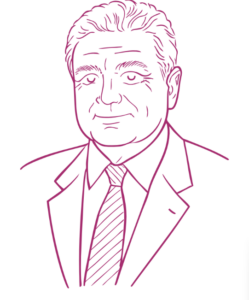(R)EVOLUTION - Jean Maurus
Jean Maurus – Modernising the distribution of automotive parts
Car maintenance would be impossible without an essential, often discreet but nevertheless crucial link: the distribution of spare parts. Behind every successful repair is a logistics chain capable of quickly supplying the right components, reliably and with high quality. In the 1970s, this sector underwent a veritable revolution in France thanks to the actions of a visionary man: Jean Maurus.
Elected president of the Fédération de la Distribution Automobile (FEDA) in 1978, Jean Maurus understood that modernising the network was essential to respond to the growth of the vehicle fleet and the increasing complexity of vehicles. At a time when repairs still depended largely on fragmented channels and heterogeneous practices, he undertook a thorough restructuring of the sector. His goal was clear: to professionalise distribution, industrialise it and make it more efficient in order to better serve garages and, ultimately, motorists.
Under his leadership, logistics was transformed. Inventory management systems, which were still artisanal, moved towards more industrial methods, inspired by the world of mass distribution and industry. The standardisation of quality standards guaranteed garages a reliable supply, reducing lead times and limiting parts errors. For repair professionals, it was a revolution: having the right part for each model quickly became a reality, making repairs more reliable and faster.
This transformation goes beyond the simple organisational aspect: it helps to lay the foundations for the modern distribution chains we know today. These structures, capable of managing massive and varied flows, have since supported the longevity of the French car fleet. They also accompany the technological evolution of vehicles, constantly integrating new references and adapting their logistics to ever more sophisticated components.
Jean Maurus’ legacy is therefore considerable. By radically reforming the distribution of spare parts, he enabled independent garages and more structured networks to better meet the expectations of motorists. More broadly, he helped to professionalise a sector which, behind the scenes, plays a vital role in the safety, reliability and sustainability of the automobile.
Even today, the vision he instilled continues to guide automotive distribution: speed, quality and constant adaptation. Thanks to his efforts, these principles have become essential standards in a constantly changing sector.



